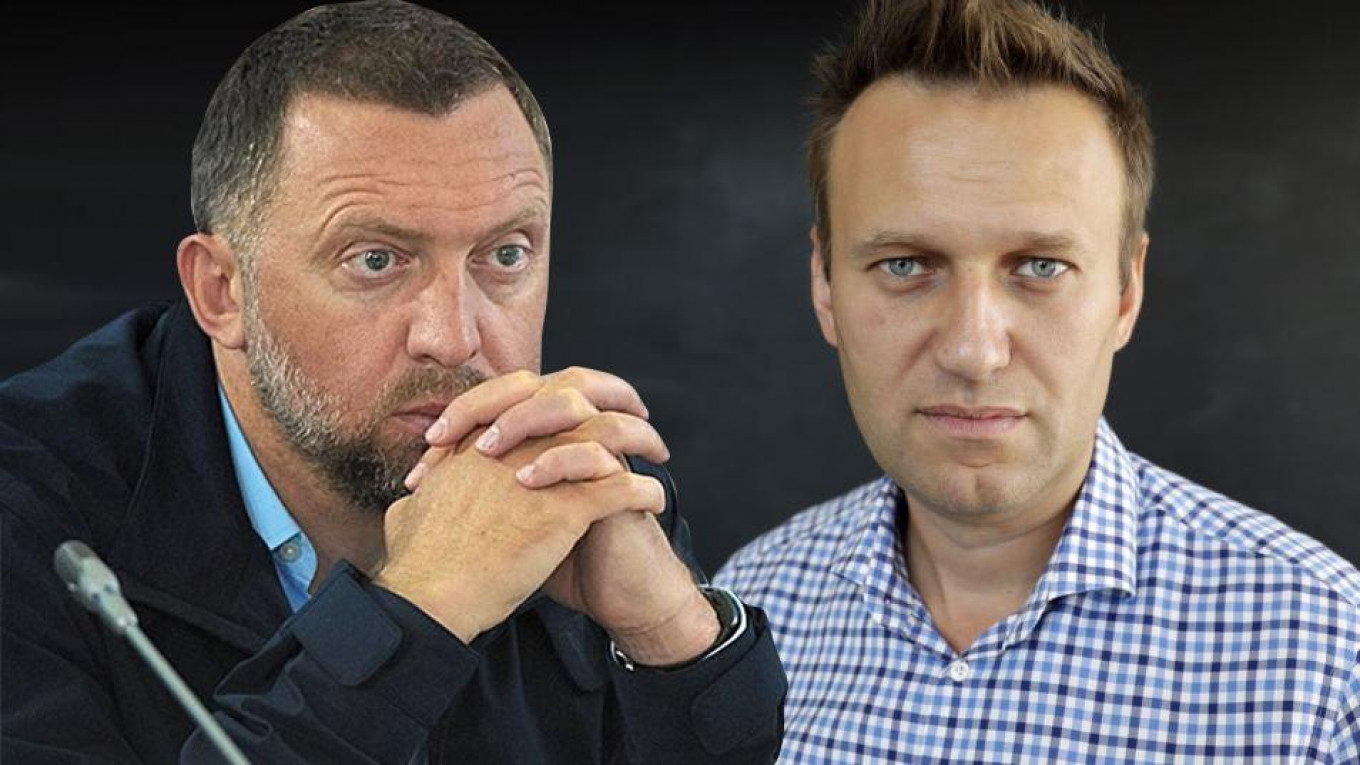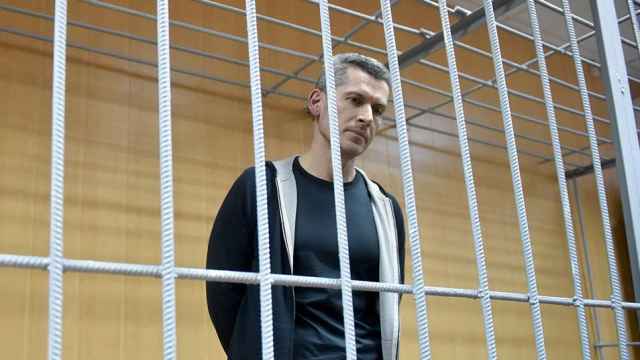The story of Sergei Prikhodko on Oleg Deripaska’s yacht could be the plot of a typical Western movie: A high-ranking government official sojourns on a yacht belonging to a billionaire in the company of call girls.
Then, an opposition politician finds out, makes the story public and ruins the reputations of both the official and the billionaire.
The combination of bribery — it is clear to everyone what the money is for — and the immorality of the scene proves to be explosive and the entire country is in shock. What follows is a happy end: the official is fired, the billionaire goes bankrupt and the opposition leader ends up becoming president.
Russia often adapts popular Western films and television shows, like Dr. House, which, in Russia, is Dr. Tyrsa. Let’s take the plot of the latest Hollywood hit “Three Billboards Outside Ebbing, Missouri” and change the place names to suit a Russian audience.
In a town somewhere in southern Russia, a young woman is brutally murdered. The police can't find the murderer, so the girl’s mother puts up three large billboards at the entrance of the town insulting the police.
Naturally, the head of the local police is upset and tries to convince the mother to take down the signs. She refuses. The agency that owns the billboards also refuses. The police chief suffers, as we find out later, partly because he is terminally ill.
Not a bad movie, right? Rooted in real life.
Today’s Russia differs too much from the cinematic West for that adaptation to be that simple.
To make it an authentic Russian drama, the head of the advertising agency would have to be detained during a police raid right as he was designing the ad. The mother who commissioned the billboards would be beaten up by hired thugs who would leave her for dead in a forest outside town. Then, the head of the police would receive an award for exemplary conduct.
That is how this story would play out in Russia.
Similarly, the story with the government official and the billionaire would look entirely different if adapted to the Russian reality. In the Russia understanding, a bribe is when an official is given money and then, out of nowhere, special agents appear and shine an ultraviolet light on his hands. That is a bribe.
Giving someone a ride on a yacht, however, is not seen as a crime. After all, the president himself vacations at a ski resort owned by a different but well-known billionaire and nobody knows who pays for it.
This kind of behavior is probably unethical and very possibly illegal, but in Russia, the rule of law only applies to those without the power to defy it. To host someone on a yacht is not bribery.
On to the “immoral” element of this story. Sure, there were call girls on the yacht. But whose reputation do they really tarnish? The billionaire is either in the process of divorcing his wife, or he has already divorced her, and, besides, Russians see the wealthy as people who can afford to have lots of everything — including women.
Ostensibly, government officials are held to higher ethical standards. But everyone knows that the relationship status of basically every prominent politician is, as they say on social media, “complicated.”
There is always a wife from back in the day, a girl they unashamedly frequent public events with or some private sauna offering “elite services” that they are not shy about visiting.
Ever since President Vladimir Putin divorced his wife, the moral standard for senior officials has noticeably fallen. Some followed in his footsteps and divorced their wives too. Others prefer to maintain two or even three separate families. These exploits often wind up in Tatler magazine or are simply revealed in candid conversation.
There are even whole institutions and an entire news channel staffed almost entirely by “spare wives” and nobody thinks the worse of them or calls them names. These are the standards now. It has become acceptable. It is normal.
The Russian version of this story would have to feature the billionaire bribing the official not with a ride on a yacht — fresh air! — but with cold hard cash. The transaction would have to be captured on camera and the bills marked with invisible ink.
To really raise eyebrows, the sexual storyline would have to go beyond the norm of what’s deemed to be acceptable. Ideally, the official would sleep with the billionaire himself. And if weren’t possible, then bring a cabin boy on board, preferably underage, and then you’ve really got a scandal. Homosexuality has not been banned officially in Russia, but it is still taboo.
Sleeping with another woman is as commonplace as being corrupt. “Can you image, Ivan Ivanovich takes sidekicks.” People might pretend to be shocked and indignant out of politeness, but they know it happens all the time.
The subplot with the opposition leader, meanwhile, already works well for Russian audiences.
It is worth remembering that in presenting these facts to Putin, Navalny is not trying to advance his own presidential ambitions. Rather, he is appealing to the leader’s sense of justice. After all, before he became president, Putin played a key role in getting another, even higher-ranking official fired for cavorting with prostitutes. Will he apply the same standard now?
As for Navalny, this is possibly the first time in his public career that he has spoken from the perspective of an ordinary citizen without making a video designed to stir up supporters, without issuing a manifesto of any sort and without challenging Putin’s right to rule. All he is asking is for the president to be consistent. He has behaved correctly. A bad screenwriter would turn this into an action flick. For good measure, they would throw in masked FSB agents, an explosion at the opposition’s offices – even before they manage to go public with their exposé – and an assassin with a laser-guided rifle.
But that would be unconvincing because every time Navalny makes a similar disclosure, the authorities never force against him or send thugs to rough him up. This time, like before, Navalny will say whatever he feels compelled to say and nobody will touch him.
The parts of this plot that don’t require tweaking are exceptions to the rule. They are an oasis of Western civilization which sometimes crop up in Russia, either despite the authorities or because they haven’t yet interfered.
The exceptions are like a lone bike path, a creative art collective, Moscow’s Central Circle train on which passengers can drink a cup of coffee without spilling a drop, imagining that they are in Berlin or London and forgetting for a few minutes about Putin, youth gangs, alcohol poisoning — all those things which set apart Europe apart Russia.
Many have suggested that these islands of Western-style comfort are a case of self-delusion. But that isn’t necessarily bad. There is a demand in Russia for a Western-style life, even if it is artificial. And it is precisely that group which forms Navalny’s audience. They believe that no matter who Navalny investigates, those individuals are inevitably guilty of serious crimes.
It is misguided to accuse Navalny of working for the Kremlin, the FSB or for Putin personally. If a statistically significant number of Russians believe Navalny is unbiased and that his investigations are impartial, that in itself is a factor to be reckoned with.
Let paranoid people rack their brains trying to figure out who set up whom – Prikhodko Deripaska, Deripaska Prikhodko, or Rosneft head Igor Sechin both of them. If the Russian people believe that nobody was set up, then that is how it is. In these cases, belief trumps suspicion.
Western audiences are already familiar with these storylines. All of these characters – the official, the billionaire, and the opposition leader – are not new for them. In fact, Westerners might see the missing link between Trump and Putin in the connection between Deripaska and Prikhodko. After all, Trump’s former campaign manager Paul Manafort used to work for Deripaska.
What’s more, Putin could shift the blame for electoral meddling on Prikhodko, send him into retirement and thereby hope that Washington would relax its stance, even though this enters the realm of fantasy.
As for Deripaska, until now, his divorce might have been seen as a ploy to transfer at least some of his holdings into his wife’s name to bypass U.S. sanctions on him. Russian oligarchs are divorcing in droves these days, raising suspicion in the West. But how can you not believe in the divorce after such evidence of his cheating? The drama here is obvious to any Western court.
The most inexplicable aspect of this story is the behavior of the escort girl who filmed the video on the yacht. Her activity on social media began six months prior to Navalny taking an interest in her story and even after his investigation came out she publicly claimed she had been “gang raped” on the yacht.
Even if taking into account her the daring nature of her profession, it suggests that she is fearless to the point of madness. Since the situation is unprecedented, it is impossible to assess the risk she is facing, but one should assume it is as high as it could be.
Who guaranteed her safety, and in what form? Why didn’t anyone stop her from posting those videos from the start? Why did she go to Navalny’s headquarters? By pushing the situation to the point of absurdity, was she trying to go along with Navalny or undermine him? The lack of answers to these questions casts doubt on the whole affair.
In a video message published after Navalny’s expose, the woman calls on everyone involved to appear on“Pust govoryat” (“Let Them Talk”), an apolitical show devoted to scandal. That sounds ominous, because oligarchs and deputy prime ministers don’t appear on these sorts of shows (Navalny, of course, cannot ever appear on them because the authorities have already banned him from the airwaves.) For that, the two men would have to lose their positions.
And so her challenge sounds like a threat, but who is actually threatening Deripaska and Prikhodko? Certainly not Navalny nor the escort girl.
Once more, we’re left with cursed uncertainty.
Oleg Kashin is a journalist at Republic, where this article was first published. The views and opinions expressed in opinion pieces do not necessarily reflect the position of The Moscow Times.
A Message from The Moscow Times:
Dear readers,
We are facing unprecedented challenges. Russia's Prosecutor General's Office has designated The Moscow Times as an "undesirable" organization, criminalizing our work and putting our staff at risk of prosecution. This follows our earlier unjust labeling as a "foreign agent."
These actions are direct attempts to silence independent journalism in Russia. The authorities claim our work "discredits the decisions of the Russian leadership." We see things differently: we strive to provide accurate, unbiased reporting on Russia.
We, the journalists of The Moscow Times, refuse to be silenced. But to continue our work, we need your help.
Your support, no matter how small, makes a world of difference. If you can, please support us monthly starting from just $2. It's quick to set up, and every contribution makes a significant impact.
By supporting The Moscow Times, you're defending open, independent journalism in the face of repression. Thank you for standing with us.
Remind me later.









